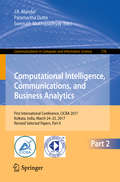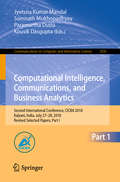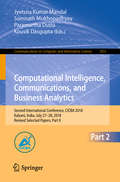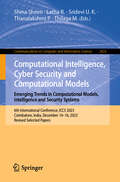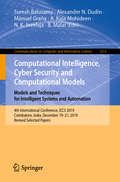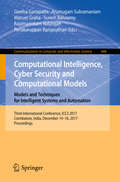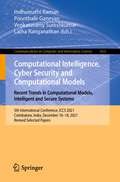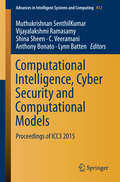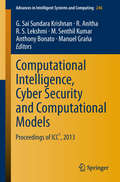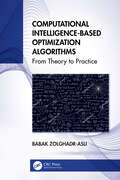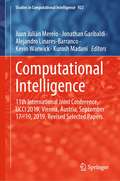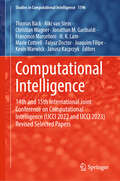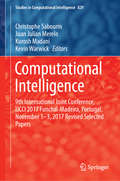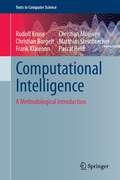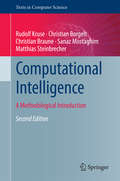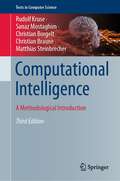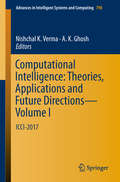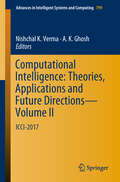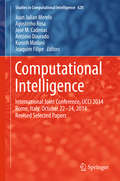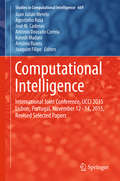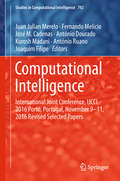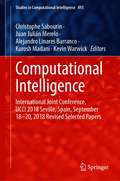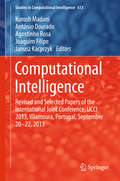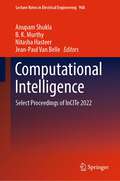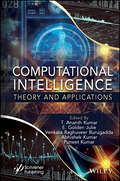- Table View
- List View
Computational Intelligence, Communications, and Business Analytics: First International Conference, CICBA 2017, Kolkata, India, March 24 – 25, 2017, Revised Selected Papers, Part II (Communications in Computer and Information Science #776)
by Paramartha Dutta J. K. Mandal Somnath MukhopadhyayThe two volume set CCIS 775 and 776 constitutes the refereed proceedings of the First International Conference on Computational Intelligence, Communications, and Business Analytics, CICBA 2017, held in Kolkata, India, in March 2017. The 90 revised full papers presented in the two volumes were carefully reviewed and selected from 276 submissions. The papers are organized in topical sections on data science and advanced data analytics; signal processing and communications; microelectronics, sensors, intelligent networks; computational forensics (privacy and security); computational intelligence in bio-computing; computational intelligence in mobile and quantum computing; intelligent data mining and data warehousing; computational intelligence.
Computational Intelligence, Communications, and Business Analytics: Second International Conference, CICBA 2018, Kalyani, India, July 27–28, 2018, Revised Selected Papers, Part I (Communications in Computer and Information Science #1030)
by Paramartha Dutta Jyotsna Kumar Mandal Somnath Mukhopadhyay Kousik DasguptaThe two volume set CCIS 1030 and 1031 constitutes the refereed proceedings of the First International Conference on Computational Intelligence, Communications, and Business Analytics, CICBA 2018, held in Kalyani, India, in July 2018.The 76 revised full papers presented in the two volumes were carefully reviewed and selected from 240 submissions. The papers are organized in topical sections on computational intelligence; signal processing and communications; microelectronics, sensors, and intelligent networks; data science & advanced data analytics; intelligent data mining & data warehousing; and computational forensics (privacy and security).
Computational Intelligence, Communications, and Business Analytics: Second International Conference, CICBA 2018, Kalyani, India, July 27–28, 2018, Revised Selected Papers, Part II (Communications in Computer and Information Science #1031)
by Paramartha Dutta Jyotsna Kumar Mandal Somnath Mukhopadhyay Kousik DasguptaThe two volume set CCIS 1030 and 1031 constitutes the refereed proceedings of the First International Conference on Computational Intelligence, Communications, and Business Analytics, CICBA 2018, held in Kalyani, India, in July 2018.The 76 revised full papers presented in the two volumes were carefully reviewed and selected from 240 submissions. The papers are organized in topical sections on computational intelligence; signal processing and communications; microelectronics, sensors, and intelligent networks; data science & advanced data analytics; intelligent data mining & data warehousing; and computational forensics (privacy and security).
Computational Intelligence, Cyber Security and Computational Models. Emerging Trends in Computational Models, Intelligence and Security Systems: 6th International Conference, ICC3 2023, Coimbatore, India, December 14–16, 2023, Revised Selected Papers (Communications in Computer and Information Science #2423)
by Shina Sheen Latha R. Sridevi U. K. Thanalakshmi P. Thilaga M.This book constitutes the proceedings of the 6th International Conference, ICC3 2023, held in Coimbatore, India, during December 14–16, 2023. The 10 full papers included in this book were carefully reviewed and selected from 86 submissions. They were organized in topical sections as follows: computational intelligence; cyber security; and computational models.
Computational Intelligence, Cyber Security and Computational Models. Models and Techniques for Intelligent Systems and Automation: 4th International Conference, ICC3 2019, Coimbatore, India, December 19–21, 2019, Revised Selected Papers (Communications in Computer and Information Science #1213)
by Manuel Graña Suresh Balusamy Alexander N. Dudin A. Kaja Mohideen N. K. Sreelaja B. MalarThis book constitutes the proceedings of the 4th International Conference on Computational Intelligence, Cyber Security, and Computational Models, ICC3 2019, which was held in Coimbatore, India, in December 2019. The 9 papers presented in this volume were carefully reviewed and selected from 38 submissions. They were organized in topical sections named: computational intelligence; cyber security; and computational models.
Computational Intelligence, Cyber Security and Computational Models. Models and Techniques for Intelligent Systems and Automation: Third International Conference, ICC3 2017, Coimbatore, India, December 14-16, 2017, Proceedings (Communications in Computer and Information Science #844)
by Manuel Graña Geetha Ganapathi Arumugam Subramaniam Suresh Balusamy Rajamanickam Natarajan Periakaruppan RamanathanThis book constitutes the proceedings of the Third International Conference on Computational Intelligence, Cyber Security, and Computational Models, ICC3 2017, which was held in Coimbatore, India, in December 2017. The 15 papers presented in this volume were carefully reviewed and selected from 63 submissions. They were organized in topical sections named: computational intelligence; cyber security; and computational models.
Computational Intelligence, Cyber Security and Computational Models. Recent Trends in Computational Models, Intelligent and Secure Systems: 5th International Conference, ICC3 2021, Coimbatore, India, December 16–18, 2021, Revised Selected Papers (Communications in Computer and Information Science #1631)
by Indhumathi Raman Poonthalir Ganesan Venkatasamy Sureshkumar Latha RanganathanThis book constitutes the proceedings of the 5th International Conference, ICC3 2021, held in Coimbatore, India, during December 16–18, 2021. The 14 full papers included in this book were carefully reviewed and selected from 84 submissions. They were organized in topical sections as follows: computational intelligence; cyber security; and computational models.
Computational Intelligence, Cyber Security and Computational Models: Proceedings of ICC3 2015 (Advances in Intelligent Systems and Computing #412)
by Anthony Bonato Lynn Batten Muthukrishnan Senthilkumar Vijayalakshmi Ramasamy Shina Sheen C. VeeramaniThis bookaims at promoting high-quality research by researchers and practitioners fromacademia and industry at the InternationalConference on Computational Intelligence, Cyber Security, and ComputationalModels ICC3 2015 organized by PSG College of Technology, Coimbatore, Indiaduring December 17 - 19, 2015. This book enriches with innovations in broadareas of research like computational modeling, computational intelligence andcyber security. These emerging inter disciplinary research areas have helped tosolve multifaceted problems and gained lot of attention in recent years. Thisencompasses theory and applications, to provide design, analysis and modelingof the aforementioned key areas.
Computational Intelligence, Cyber Security and Computational Models: Proceedings of ICC3, 2013 (Advances in Intelligent Systems and Computing #246)
by G. Sai Sundara Krishnan R. Anitha R. S. Lekshmi M. Senthil Kumar Anthony Bonato Manuel GrañaThis book contains cutting-edge research material presented by researchers, engineers, developers, and practitioners from academia and industry at the International Conference on Computational Intelligence, Cyber Security and Computational Models (ICC3) organized by PSG College of Technology, Coimbatore, India during December 19-21, 2013. The materials in the book include theory and applications to provide design, analysis, and modeling of the key areas. The book will be useful material for students, researchers, professionals, as well academicians in understanding current research trends and findings and future scope of research in computational intelligence, cyber security, and computational models.
Computational Intelligence-based Optimization Algorithms: From Theory to Practice
by Babak Zolghadr-AsliComputational intelligence-based optimization methods, also known as metaheuristic optimization algorithms, are a popular topic in mathematical programming. These methods have bridged the gap between various approaches and created a new school of thought to solve real-world optimization problems. In this book, we have selected some of the most effective and renowned algorithms in the literature. These algorithms are not only practical but also provide thought-provoking theoretical ideas to help readers understand how they solve optimization problems. Each chapter includes a brief review of the algorithm’s background and the fields it has been used in. Additionally, Python code is provided for all algorithms at the end of each chapter, making this book a valuable resource for beginner and intermediate programmers looking to understand these algorithms.
Computational Intelligence: 11th International Joint Conference, IJCCI 2019, Vienna, Austria, September 17–19, 2019, Revised Selected Papers (Studies in Computational Intelligence #922)
by Kevin Warwick Kurosh Madani Juan Julián Merelo Jonathan Garibaldi Alejandro Linares-BarrancoThis present book includes a set of selected revised and extended versions of the best papers presented at the 11th International Joint Conference on Computational Intelligence (IJCCI 2019) – held in Vienna, Austria, from 17 to 19 September 2019. The authors focus on three outstanding fields of Computational Intelligence through the selected panel, namely Evolutionary Computation, Fuzzy Computation and Neural Computation. Besides presenting the recent advances of the selected areas, the book aims to aggregate new and innovative solutions for confirmed researchers and, on the other hand, to provide a source of information and/or inspiration for young interested researchers or learners in the ever-expanding and current filed of Computational Intelligence. It constitutes a precious provision of knowledge for individual researchers as well as represents a valuable sustenance for collective use in academic libraries (of universities and engineering schools) relating innovative techniques in various fields of applications.
Computational Intelligence: 14th and 15th International Joint Conference on Computational Intelligence (IJCCI 2022 and IJCCI 2023) Revised Selected Papers (Studies in Computational Intelligence #1196)
by Thomas Bäck Kevin Warwick Joaquim Filipe Janusz Kacprzyk Christian Wagner Marie Cottrell Jonathan M. Garibaldi Niki Van Stein Francesco Marcelloni H. K. Lam Faiyaz DoctorThe present book includes a set of selected revised and extended versions of the best papers presented at the 14th and 15th International Joint Conference on Computational Intelligence (IJCCI 2022 and IJCCI 2023) – held respectively in Valletta, Malta, between October 24–26, 2022 and Rome, Italy, between November 13–15. We focus on three outstanding fields of Computational Intelligence through the selected panel, namely: Evolutionary Computation, Fuzzy Computation and Neural Computation. Beside presenting the recent advances of the selected areas, the book aims to aggregate new and innovative solutions for confirmed researchers, and on the other hand to provide a source of information and/or inspiration for young interested researchers or learners in the ever expanding and current filed of Computational Intelligence. It could constitute a precious provision of knowledge for individual researchers as well as represent a valuable sustenance for collective use in academic libraries (ofuniversities and engineering schools) relating innovative techniques in various fields of applications.
Computational Intelligence: 9th International Joint Conference, IJCCI 2017 Funchal-Madeira, Portugal, November 1-3, 2017 Revised Selected Papers (Studies in Computational Intelligence #829)
by Kevin Warwick Juan Julian Merelo Kurosh Madani Christophe SabourinThis book presents revised and extended versions of the best papers presented at the 9th International Joint Conference on Computational Intelligence (IJCCI 2017), held in Funchal, Madeira, from 1 to 3 November 2017. It focuses on four of the main fields of computational intelligence: evolutionary computation, fuzzy computation, neural computation, and cognitive and hybrid systems. As well as presenting the recent advances of these areas, it provides new and innovative solutions for established researchers and a source of information and/or inspiration those new to the field. Discussing innovative techniques in various application areas, it is a useful resource for individual researchers and a valuable addition to academic libraries (of universities and engineering schools).
Computational Intelligence: A Methodological Introduction (Texts in Computer Science #739)
by Frank Klawonn Matthias Steinbrecher Rudolf Kruse Pascal Held Christian Borgelt Christian MoewesThis clearly-structured, classroom-tested textbook/reference presents a methodical introduction to the field of CI. Providing an authoritative insight into all that is necessary for the successful application of CI methods, the book describes fundamental concepts and their practical implementations, and explains the theoretical background underpinning proposed solutions to common problems. Only a basic knowledge of mathematics is required. Features: provides electronic supplementary material at an associated website, including module descriptions, lecture slides, exercises with solutions, and software tools; contains numerous examples and definitions throughout the text; presents self-contained discussions on artificial neural networks, evolutionary algorithms, fuzzy systems and Bayesian networks; covers the latest approaches, including ant colony optimization and probabilistic graphical models; written by a team of highly-regarded experts in CI, with extensive experience in both academia and industry.
Computational Intelligence: A Methodological Introduction (Texts in Computer Science #739)
by Matthias Steinbrecher Rudolf Kruse Christian Borgelt Christian Braune Sanaz MostaghimThe book aims to merge Computational Intelligence with Data Mining, which are both hot topics of current research and industrial development, Computational Intelligence, incorporates techniques like data fusion, uncertain reasoning, heuristic search, learning, and soft computing. Data Mining focuses on unscrambling unknown patterns or structures in very large data sets. Under the headline "Discovering Structures in Large Databases" the book starts with a unified view on 'Data Mining and Statistics - A System Point of View'. Two special techniques follow: 'Subgroup Mining', and 'Data Mining with Possibilistic Graphical Models'. "Data Fusion and Possibilistic or Fuzzy Data Analysis" is the next area of interest. An overview of possibilistic logic, nonmonotonic reasoning and data fusion is given, the coherence problem between data and non-linear fuzzy models is tackled, and outlier detection based on learning of fuzzy models is studied. In the domain of "Classification and Decomposition" adaptive clustering and visualisation of high dimensional data sets is introduced. Finally, in the section "Learning and Data Fusion" learning of special multi-agents of virtual soccer is considered. The last topic is on data fusion based on stochastic models.
Computational Intelligence: A Methodological Introduction (Texts in Computer Science)
by Matthias Steinbrecher Rudolf Kruse Christian Borgelt Christian Braune Sanaz MostaghimThis textbook provides a clear and logical introduction to the field, covering the fundamental concepts, algorithms and practical implementations behind efforts to develop systems that exhibit intelligent behavior in complex environments. This enhanced third edition has been fully revised and expanded with new content on deep learning, scalarization methods, large-scale optimization algorithms, and collective decision-making algorithms. Features: provides supplementary material at an associated website; contains numerous classroom-tested examples and definitions throughout the text; presents useful insights into all that is necessary for the successful application of computational intelligence methods; explains the theoretical background underpinning proposed solutions to common problems; discusses in great detail the classical areas of artificial neural networks, fuzzy systems and evolutionary algorithms; reviews the latest developments in the field, covering such topics as ant colony optimization and probabilistic graphical models.
Computational Intelligence: ICCI-2017 (Advances in Intelligent Systems and Computing #798)
by A. K. Ghosh Nishchal K. VermaThis book presents selected proceedings of ICCI-2017, discussing theories, applications and future directions in the field of computational intelligence (CI). ICCI-2017 brought together international researchers presenting innovative work on self-adaptive systems and methods. This volume covers the current state of the field and explores new, open research directions. The book serves as a guide for readers working to develop and validate real-time problems and related applications using computational intelligence. It focuses on systems that deal with raw data intelligently, generate qualitative information that improves decision-making, and behave as smart systems, making it a valuable resource for researchers and professionals alike.
Computational Intelligence: ICCI-2017 (Advances in Intelligent Systems and Computing #799)
by A. K. Ghosh Nishchal K. VermaThis book presents selected proceedings of ICCI-2017, discussing theories, applications and future directions in the field of computational intelligence (CI). ICCI-2017 brought together international researchers presenting innovative work on self-adaptive systems and methods. This volume covers the current state of the field and explores new, open research directions. The book serves as a guide for readers working to develop and validate real-time problems and related applications using computational intelligence. It focuses on systems that deal with raw data intelligently, generate qualitative information that improves decision-making, and behave as smart systems, making it a valuable resource for researchers and professionals alike.
Computational Intelligence: International Joint Conference, IJCCI 2014 Rome, Italy, October 22-24, 2014 Revised Selected Papers (Studies in Computational Intelligence #620)
by Joaquim Filipe Juan Julian Merelo Agostinho Rosa José M. Cadenas António Dourado Kurosh MadaniThe present book includes a set of selected extended papers from the sixth International Joint Conference on Computational Intelligence (IJCCI 2014), held in Rome, Italy, from 22 to 24 October 2014. The conference was composed by three co-located conferences: The International Conference on Evolutionary Computation Theory and Applications (ECTA), the International Conference on Fuzzy Computation Theory and Applications (FCTA), and the International Conference on Neural Computation Theory and Applications (NCTA). Recent progresses in scientific developments and applications in these three areas are reported in this book. IJCCI received 210 submissions, from 51 countries, in all continents. After a double blind paper review performed by the Program Committee, 15% were accepted as full papers and thus selected for oral presentation. Additional papers were accepted as short papers and posters. A further selection was made after the Conference, based also on the assessment of presentation quality and audience interest, so that this book includes the extended and revised versions of the very best papers of IJCCI 2014. Commitment to high quality standards is a major concern of IJCCI that will be maintained in the next editions, considering not only the stringent paper acceptance ratios but also the quality of the program committee, keynote lectures, participation level and logistics.
Computational Intelligence: International Joint Conference, IJCCI 2015 Lisbon, Portugal, November 12-14, 2015, Revised Selected Papers (Studies in Computational Intelligence #669)
by Joaquim Filipe Agostinho Rosa José M. Cadenas Kurosh Madani Juan Julián Merelo António Dourado Correia António RuanoThis book includes a selection of revised and extended versions of the best papers from the seventh International Joint Conference on Computational Intelligence (IJCCI 2015), held in Lisbon, Portugal, from 12 to 14 November 2015, which was composed of three co-located conferences: The International Conference on Evolutionary Computation Theory and Applications (ECTA), the International Conference on Fuzzy Computation Theory and Applications (FCTA), and the International Conference on Neural Computation Theory and Applications (NCTA). The book presents recent advances in scientific developments and applications in these three areas, reflecting the IJCCI’s commitment to high quality standards.
Computational Intelligence: International Joint Conference, IJCCI 2016 Porto, Portugal, November 9–11, 2016 Revised Selected Papers (Studies in Computational Intelligence #792)
by Joaquim Filipe Juan Julian Merelo José M. Cadenas António Dourado Kurosh Madani António Ruano Fernando MelícioThis book gathers revised and extended versions of the best papers presented at the 8th International Joint Conference on Computational Intelligence (IJCCI 2016), which was held in Porto, Portugal from 9 to 11 November 2016. The papers address three main fields of Computational Intelligence, namely: Evolutionary Computation, Fuzzy Computation, and Neural Computation. In addition to highlighting recent advances in these areas, the book offers veteran researchers new and innovative solutions, while also providing a source of information and inspiration for newcomers to the field.
Computational Intelligence: International Joint Conference, IJCCI 2018 Seville, Spain, September 18–20, 2018 Revised Selected Papers (Studies in Computational Intelligence #893)
by Kevin Warwick Kurosh Madani Juan Julián Merelo Christophe Sabourin Alejandro Linares BarrancoThis present book includes a set of selected revised and extended versions of the best papers presented at the 10th International Joint Conference on Computational Intelligence (IJCCI 2018), held in Seville, Spain, from 18 to 20 September 2018, which covers four thriving fields in Computational Intelligence: Evolutionary Computation, Fuzzy Computation, Neural Computation, and Cognitive and Hybrid Systems. Besides presenting the recent advances in these areas, the book aims, on the one hand, to aggregate new and innovative solutions for confirmed researchers and, on the other hand, to provide a source of information and/or inspiration for young researchers or learners interested in the ever-increasing and current field of Computational Intelligence. This book constitutes a precious provision of knowledge for individual researchers as well as representing a valuable sustenance for collective use in academic libraries (of universities and engineering schools) relating innovative techniques in various fields of applications.
Computational Intelligence: Revised and Selected Papers of the International Joint Conference, IJCCI 2013, Vilamoura, Portugal, September 20-22, 2013 (Studies in Computational Intelligence #613)
by Joaquim Filipe Janusz Kacprzyk Agostinho Rosa António Dourado Kurosh MadaniThe present book includes a set of selected extended papers from the fifth International Joint Conference on Computational Intelligence (IJCCI 2013), held in Vilamoura, Algarve, Portugal, from 20 to 22 September 2013. The conference was composed by three co-located conferences: The International Conference on Evolutionary Computation Theory and Applications (ECTA), the International Conference on Fuzzy Computation Theory and Applications (FCTA), and the International Conference on Neural Computation Theory and Applications (NCTA). Recent progresses in scientific developments and applications in these three areas are reported in this book. IJCCI received 111 submissions, from 30 countries, in all continents. After a double blind paper review performed by the Program Committee, only 24 submissions were accepted as full papers and thus selected for oral presentation, leading to a full paper acceptance ratio of 22%. Additional papers were accepted as short papers and posters. A further selection was made after the Conference, based also on the assessment of presentation quality and audience interest, so that this book includes the extended and revised versions of the very best papers of IJCCI 2013. Commitment to high quality standards is a major concern of IJCCI that will be maintained in the next editions, considering not only the stringent paper acceptance ratios but also the quality of the program committee, keynote lectures, participation level and logistics.
Computational Intelligence: Select Proceedings of InCITe 2022 (Lecture Notes in Electrical Engineering #968)
by Anupam Shukla B. K. Murthy Nitasha Hasteer Jean-Paul Van BelleThe book constitutes the peer-reviewed proceedings of the 2nd International Conference on Information Technology (InCITe-2022): The Next Generation Technology Summit. The theme of the conference is Computational Intelligence: Automate your World. The volume is a conglomeration of research papers covering interdisciplinary research and in-depth applications of computational intelligence, deep learning, machine learning, artificial intelligence, data science, enabling technologies for IoT, blockchain, and other futuristic computational technologies. The volume covers various topics that span cutting-edge, collaborative technologies and areas of computation. The content would serve as a rich knowledge repository on information & communication technologies, neural networks, fuzzy systems, natural language processing, data mining & warehousing, big data analytics, cloud computing, security, social networks and intelligence, decision making, and modeling, information systems, and IT architectures. The book will be useful to researchers, practitioners, and policymakers working in information technology.
Computational Intelligence: Theory and Applications
by Abhishek Kumar Puneet Kumar E. Golden Julie T. Ananth Kumar Venkata Raghuveer BurugaddaThis book provides a comprehensive exploration of computational intelligence techniques and their applications, offering valuable insights into advanced information processing, machine learning concepts, and their impact on agile manufacturing systems. Computational Intelligence presents a new concept for advanced information processing. Computational Intelligence (CI) is the principle, architecture, implementation, and growth of machine learning concepts that are physiologically and semantically inspired. Computational Intelligence methods aim to develop an approach to evaluating and creating flexible processing of human information, such as sensing, understanding, learning, recognizing, and thinking. The Artificial Neural Network simulates the human nervous system’s physiological characteristics and has been implemented numerically for non-linear mapping. Fuzzy Logic Systems simulate the human brain’s psychological characteristics and have been used for linguistic translation through membership functions and bioinformatics. The Genetic Algorithm simulates computer evolution and has been applied to solve problems with optimization algorithms for improvements in diagnostic and treatment technologies for various diseases. To expand the agility and learning capacity of manufacturing systems, these methods play essential roles. This book will express the computer vision techniques that make manufacturing systems more flexible, efficient, robust, adaptive, and productive by examining many applications and research into computational intelligence techniques concerning the main problems in design, making plans, and manufacturing goods in agile manufacturing systems.
